
A heavy tick infestation on a White-chinned Petrel (from the publication)
Amandine Gamble (CEFE CNRS, Université Montpellier, France) and colleagues have published in the journal Frontiers in Ecology and the Environment on a tick infestation on two White‐chinned Petrels Procellaria aequinoctialis. It seems the birds were found dead.
The short note’s text follows:
“In December 2017, on Possession Island (part of the Crozet Archipelago in the southern Indian Ocean), we observed two breeding white‐chinned petrels (Procellaria aequinoctialis) with very high levels of tick (Ixodes kerguelenensis) infestation on both eyes. This degree of infestation was likely responsible for the birds’ death. Although this rare observation may seem anecdotal, it reveals that ticks can be fatal for a long‐lived colonial seabird species, in this case one that is already under pressure from fisheries bycatch and predation by introduced black rats (Rattus rattus). It also raises questions about the frequency and spatial distribution of such a phenomenon and the conditions that may have been responsible for its occurrence. Such high parasite loads imply high local tick abundances but also a lack of preening by the partner. Could this be linked to the recent death of the partner? Infestations by ticks can affect the health of hosts through blood loss, the injection of toxins, and the transmission of infectious agents. In this instance, the mechanical blocking of eyesight may also have affected the birds’ behavior. The potential impact of climate change on local parasitic infestation levels is another important question. Parasites and diseases can harm endangered species in polar and subpolar areas, and could play critical roles in some circumstances.”
Reference:
Gable, A., Weimerskirch, H. & Boulinier, T. 2020. Seabirds blinded by ticks. Frontiers in Ecology and the Environment 18. doi:10.1002/fee.2237.
John Cooper, ACAP Information Officer, 19 August 2020

 English
English  Français
Français  Español
Español